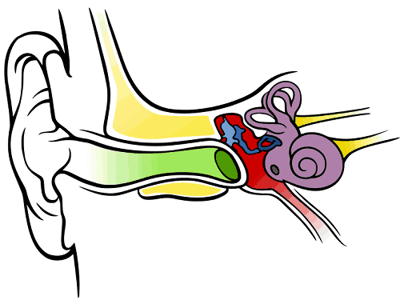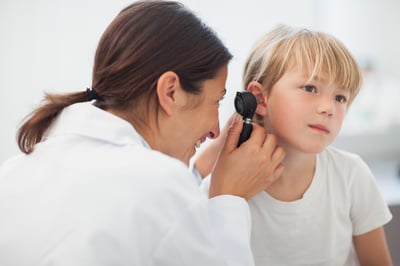Time to Read: 7 minutes
Not all types of hearing loss are the same. How that loss is caused may make a difference to the hearing solutions that will be recommended to you.
Here we take a look at four types of hearing loss starting at conditions that affect the outer ear, the inner ear, and finally the brain.
Conductive
 Conductive hearing loss is caused when the sound your ears pick up doesn’t get through the outer and middle ear to your inner ear. This results in things you hear sounding muffled, particularly softer sounds.
Conductive hearing loss is caused when the sound your ears pick up doesn’t get through the outer and middle ear to your inner ear. This results in things you hear sounding muffled, particularly softer sounds.
There are a number of reasons for that. Some of them can be temporary in nature such as a wax blockage, a middle ear infection or fluid in the middle ear as a result of colds or allergies.
Other causes might be more permanent such as a hole in the ear drum or by a condition called otosclerosis where a bony growth forms around a small bone in the middle ear, preventing it from vibrating when stimulated by sound. This condition is sometimes known as Surfers Ear.
Read more:
Surgery to correct the problem might work, but in other cases hearing aids are prescribed to get clear sound past the damaged part of the ear to the inner ear where it sends the signal to your brain.
Sensorineural
 Sensorineural Hearing Loss is when there is damage to the inner ear that prevents the sound from reaching the brain.
Sensorineural Hearing Loss is when there is damage to the inner ear that prevents the sound from reaching the brain.
There can be a number of reasons for that:
- Age
- Exposure to loud sounds
- Head trauma
- Particular medical conditions
- Some medicines, and
- Genetic conditions
Before we explore this further, we need to look at Sudden Sensorineural Hearing Loss.
Sudden Sensorineural Hearing Loss - if you experience sudden hearing loss in one ear, then make an appointment to see your doctor immediately. There are a number of serious causes for this which you want the doctor to address. Depending on the cause, quick assessment and treatment can help your hearing recover.
Causes of Sudden Sensorineural Hearing Loss appears to be associated with viruses or bacterial infections. Certain medications can also affect your hearing, so it is important that you regularly consult with your doctor about medication prescribed to you.
Read more:
- How to protect your hearing during cold and flu season
- COVID-19 and hearing loss
- Medicines which might affect your hearing
Most common Sensorineural Hearing Loss happens gradually over time and accounts for about 90% of all hearing loss.
In this type of hearing loss, hairs in the cochlea - the semi-circular structure in your inner ear - have died off. Usually it is the hairs responsible for transmitting higher frequencies which go first. And they just happen to be the frequencies we need to correctly discern the nuances of speech.
Because of its gradual nature, it is estimated many people don’t recognise their hearing loss until up to half of those hair cells have gone.
While this process cannot be reversed, it can be successfully helped most of the time with the use of hearing aids.
Since age is a factor in hearing loss (it comes with its own specific name: presbycusis), it is important to add a regular hearing check to your health routine after the age of 50.
Read more:
Auditory Neuropathy
 In this condition, the ear may be working exactly as it should - sound is coming into the outer ear, then being picked up by the inner ear but the person still cannot make out speech.
In this condition, the ear may be working exactly as it should - sound is coming into the outer ear, then being picked up by the inner ear but the person still cannot make out speech.
It is not a common condition and its causes may vary:
- damage to hair cells in the inner ear
- the connections between the hair cells and the cochlear nerve
- the cochlear nerve itself
- the eighth cranial nerve (the combination of the cochlear and vestibular nerves)
- auditory pathways in the brain stem.
Scientists are still researching the causes and risk factors for the condition. Auditory Neuropathy has a genetic link and it is also a risk factor for those born prematurely or were a low birth weight
Mixed Hearing Loss
As the name suggests, it is possible that your hearing loss is a combination of both conductive hearing loss and sensorineural hearing loss.
This is why it is so important to have regular hearing tests and work with both your GP and your audiologist to look at ways to help maximise your best possible hearing.
Read more:

